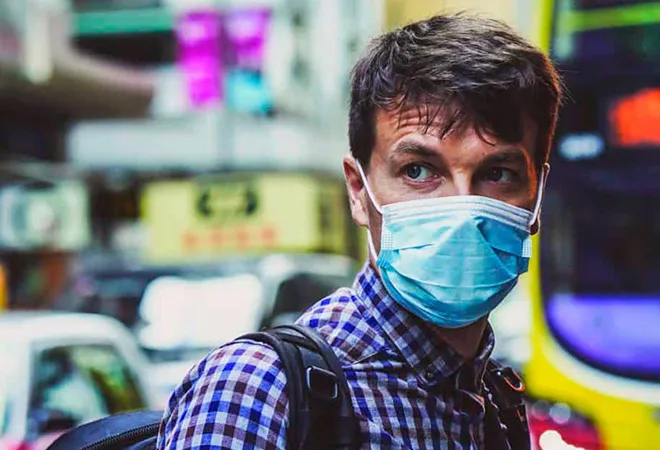-
CENTRES
Progammes & Centres
Location

Until recently, COVID-19 was the Georgian government's best friend. According to a survey by the International Republican Institute (IRI) in October last year, only 22 percent of the country's population believed that Georgia was developing in the right direction. In June 2020, this figure was 38 percent. This figure is an indicator of the attitude of the population towards the government and no ratings of political parties will replace it. But the rating of the ruling Georgian Dream party is related with this indicator.
What happened? The Georgian government adopted a "new course", borrowing the analogy of former US President Franklin D Roosevelt, but did Georgia get the Marshall plan or did it begin to implement reforms in the style of Lee Kuan Yew or Deng Xiaoping? The change in public opinion is a direct result of the government's supposed “victory” over COVID-19. According to the IRI study, 79 percent of the population have a positive assessment of the government's efforts to combat the pandemic, 41 percent are unconditionally positively, and 38 percent generally positively. For Georgia, this is a very atypical result; generally, the country's population is extremely critical of all actions taken by the authorities. Only 20 percent assessed the actions of the authorities negatively. This means that only the most stubborn opponents of the authorities believe that the Georgian Dream acted incorrectly in tackling the COVID-19.
Indeed, it is hard to deny the obvious—Georgia is one of the few countries that is in the green zone. At the time of writing, the country, which has a population of about four million, has reported 1830 cases and 19 deaths. Georgia’s neighbours are worse-off. Armenia, with a population of about three million people, has reported 45,326 cases and 906 deaths, and Azerbaijan, which has a population of about 10 million people, has had 37,732 cases and 505 deaths. In comparison, the achievements of the Georgian authorities are impressive.
According to IRI poll, the National Center for Disease Control (NCDC) has received the highest rating among state and public institutions. NCDC actions were positively assessed by 94 percent of all respondents, and only 5 percent were dissatisfied. Meanwhile, 91 percent had a positive assessment of the health ministry’s activities and 81 percent had a positive assessment the work of the Prime Minister's Office.
The assessment of the activities of the patriarchate of Georgia looks strange, which strictly refused to prohibit services in churches and communion of parishioners from one spoon during the Easter holiday; 69 percent of the respondents approved of this step by the Georgian Orthodox Church. Paata Imnadze, director of the Lugar Research Centre’s laboratory, even had to speak on television with a warning that if there were many people at the services during Easter, there would be a lot of coffins. Then, to avoid the uncontrolled spread of the disease, the authorities had to take emergency measures to impose a ban on the movement of vehicles throughout the country. Despite this, 71 percent of respondents positively assessed the actions of the patriarchate, which is less an indication of Georgian’s religiosity and the mysteriousness of the “Georgian Dream”, and more about the coexistence of several parallel, mutually exclusive realities associated with fears in people’s minds.
The majority of respondents rated the actions of the authorities in the economic (50 percent) and social spheres (59 percent) positively. Yet, when asked how the economic situation in Georgia has changed since the start of the pandemic, 82 percent of respondents answered that it has worsened, and 40 percent that it has worsened very much and only 15 percent think that nothing has changed. Moreover, 77 percent of respondents said that the pandemic had a negative impact on their family’s economic situation, with 25 percent facing a critically negative impact.
What do these numbers tell us? The Georgian populace appears to understand the limitations of the government. For a long time, people have heard the simple idea that we are facing a choice between health and economic wellbeing. Someone who has made his choice in favour of health is inclined to perceive all other actions by the authorities against this measure. In addition, one should not forget that state employees, who make up a significant part of the population, have lost almost nothing. During the quarantine, all state employees were paid salaries, and officials even received allowances and bonuses.
The opposition played a significant role in creating this perception of the situation by reacting to events with information injections instead of presenting an alternative plan, backed by scientific and other expert opinion, to deal with the pandemic. As a result, the majority of the population viewed the opposition as simply pressurising the authorities without being able to offer a reasonable alternative. Despite active preparations for the upcoming parliamentary elections (scheduled for 30 October), opposition parties saw their ratings dip (only 11 percent of participants responded positively to the question of if they trust political parties).
The ruling party can stay calm ahead of the elections. The government’s handling of the pandemic, with loans and financial assistance from Western partners, has been well received. Praise has also been heaped on Georgia’s “three musketeers”—Amiran Gamkrelidze, head of the National Center of Health Center, Tengiz Tsertsvadze, director of the Tbilisi Center for Infectious Diseases, AIDS and Immunology and Imnadze—for their handling of the crisis. About 33 percent of respondents said they would vote for the ruling Georgian Dream party if elections were held now, which is twice more than those who said they would vote for the main opposition party, United National Movement.
However, in September, the situation began to change. On 5 September, the country reported its highest-ever number of infections in a day (36); on 9 September, this figure increased to 45 patients; and on 11 September, this figure rose to 57 people. Georgia has been hit by the second wave of the pandemic, but the government no longer appears to have the tools for an effective response, for several reasons.
First, the population is not psychologically ready for new restrictions after the “victory” over COVID-19. Only 61 percemt of the population believes that COVID-19 is a serious threat to them and their families, while 38 percent are very calm about the pandemic. In such a situation, it is extremely difficult to force the population to put up with new restrictions on freedom and loss of income.
Next, the second wave of the pandemic has called into question the effectiveness of the government’s original measures to handle the crisis. If the current infection numbers are higher than a few months ago, why are the authorities not introducing strict quarantines and isolation measures? Were these measures needed a few months ago? The government and the ‘three musketeers’ are being forced to justify their decisions.
Third is the question of the work of state institutions. Was Georgia really closed from the outside world all this time? No. In theory, the protocol of arrival in Georgia provides for mandatory quarantine and testing. But in practice, there have been exceptions, especially for for ‘insiders’. The population was sympathetic to the fact that entrepreneurs close to the government received orders for quarantining people arriving in Georgia and made good money in the face of a general crisis. But in such a situation it is rather difficult to expect the population to understand that the rules do not exist for everyone. And the line of occupation is very transparent with Abkhazia, through which tourists from Russia freely travel. Contraband products with Abkhazia ‘excise stamps’ are openly sold throughout western Georgia, speaking volumes of the strength of the state institutions. Yet, no one is willing to consider that this contraband trade could be the source of new infections. The authorities ignored the lack of compliance with strict rules as long as it did not create a threat to society. But now people are beginning to wonder what the real main threat is—the authorities allowing the violation of strict rules or imposing the strict rules as a tool to manipulate society?
The government can no longer ignore the growth of the pandemic since it can have unpredictable consequences. All political capital earned by the Georgian Dream over the last eight years is now tied to the “victory” against COVID-19. Rescheduling the elections is out of the question. The authorities are well aware that the socio-economic situation is only set to get worse. This means that the rating of the ruling party will also fall. Will the authorities manage to stop the second wave of the pandemic or will things get worse? The opposition is in no way ready to lead, but what will happen if the epidemiological situation in the country worsens?. There will be no trace of a “victory” over COVID-19, compromising the ruling party’s standing. The health and social status of citizens is important, but power is more important for politicians.
The views expressed above belong to the author(s). ORF research and analyses now available on Telegram! Click here to access our curated content — blogs, longforms and interviews.

Gela Vasadze is director of Regional Programs at the Georgian Strategic Analysis Center.
Read More +